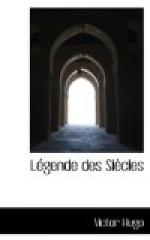[Footnote 1: It is interesting to observe how frequently his heroes are old men, as Eviradnus, Booz, Fabrice.]
Hugo himself says sadly in his Preface, ’Les tableaux riants sont rares dans ce livre; cela tient a ce qu’ils ne sont pas frequents dans l’histoire,’ but in truth the tinge of gloom which lies upon the Legende is rather the impress upon the volume of history of the poet’s own puissant individuality. He was no scientist and no savant, he had none of that spirit of imperturbable calm with which Shakespeare surveyed all mankind, none of that impartial sympathy with which Browning investigated the psychology of saints and sinners alike. He loved deeply and he hated fiercely, and his poetry was the voice of his love and his hate. The intensity of his own poetic vision made the past stand before him as clearly as the present; the note of personal feeling is as clear and strong in Sultan Mourad and Bivar as in Les Chatiments or Le Retour de l’Empereur. His great qualities of heart and mind and his singular defects are written large upon every page of the Legende. His passionate hatred of injustice and his passionate love of liberty, his reverence for the virtues of the home, and especially for filial obedience and respect, his love for little children, his antagonism to war and his admiration for what is great in war which was ever struggling with that antagonism, his patriotic feeling for the triumphs of the Napoleonic era, to him the heroic age of French history, his exaggerated belief in the wickedness of kings and the innocence of poor people, the exaltation of pity into the greatest of all virtues—these and many other characteristic traits find ample illustration in his legend of the centuries. It is ever Hugo that is speaking to us, however many be the masks that he wears.




